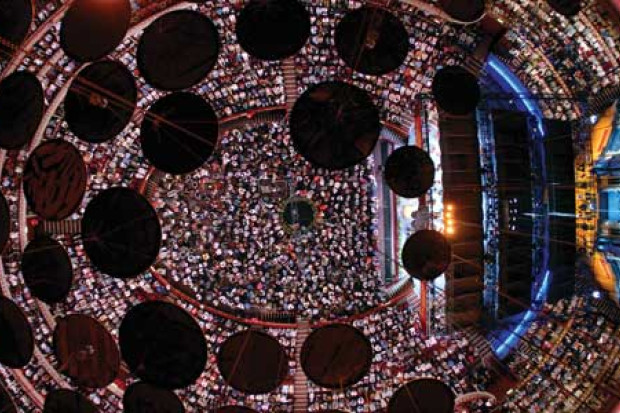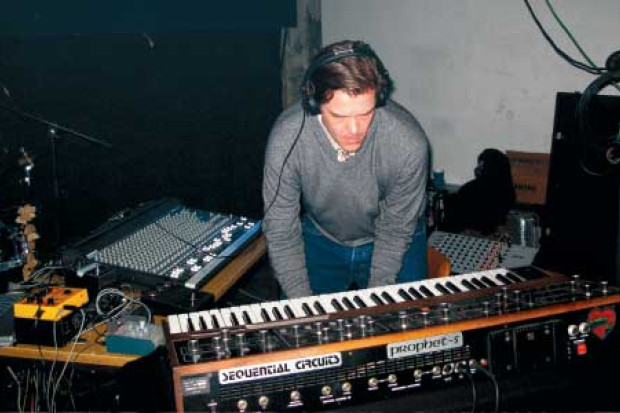Singing Between the Cracks
Yehudi Menuhin is credited with saying music is the only unpunished passion. In the case of serious modern music it appears to be also the only unrewarded passion.
By serious music I mean organised sound that attempts to escape on the one hand from the lachrymose smog of the nineteenth century, and on the other from the tyranny of the disco beat; music that emerges from a low threshold of boredom and cannot be instantly reproduced by pub pianists such as I.
Why is there little place for serious modern music in popular contemporary life? Are the composers of such music simply out of touch, defiant non-conformists, Great Refusers, charlatans, bores, elitists, and in general manufacturers of inaccessible ‘squeaky gate’ music? Are they wilfully inaccessible? Are the sounds they make simply protests at banality? Are they just trying to be different and in the process going up their own cul-de-sacs?
I think of two contrasting visits to the NCH in Dublin. On one occasion, at a mostly Mozart concert, I sat beside a plump Saudi-Arabian, a self-proclaimed adorer of Mozart. He snored his way through the concert. The auditorium was packed. I was embarassed. The other occasion was a concert of Roger Doyle music. There were less than a hundred people there. This means that either Doyle’s music is unattractive – which I disbelieve – or that the customary bourgeois Dublin music audience is ineducable. I suspect the latter.
Perhaps it has less to do with taste in music than with acculturation. If one is reared, as I was, on Sigmund Romberg, Rogers and Hammerstein, Gilbert and Sullivan, John McCormack and Italian Opera, one finds apparent discordancy intolerable. And serious modern music appears to thrive on discordancy. But discordancy presumes a canon of accord. Therein lies the problem. We are locked ethnocentrically and imperialistically into a Weltanschauung that presupposes the inferiority of everything that is not descended in a direct line from Graeco-Roman civilisation. We are not accustomed to Chinese music – nor to any music outside the ponderous inheritance of European classical music – so in general we find it unappealing. Even traditional sean-nós singing falls uneasily on the most sophisticated urban Irish ears. Like children, we distrust the unfamiliar. And as we have been given little opportunity to grow accustomed to the conventions of modern music, we mistrust it too.
Paradoxically, we are continually exposed to such modern musical idioms but in a context that is not conducive to our noticing it. Indeed, if we notice it, that means it has failed. It should be felt, but not attended to. I am referring to some film music. Because it is written to accompany images, the impression is given that it cannot stand on its own. I am not alluding to saccharine stuff like The Piano or even hummable and whistleable tunes from The Magnificent Seven or Bridge over the River Kwai and certainly not The Sound of Music. I mean music without which the filmic images would lose most of their emotional content. In the best of such music there are modes, devices and apparent dissonances that would be quite at home in the most avant-garde opus. An Alban Berg plinkety-plonk suits many a horror movie. Where would cowboy westerns be without Aaron Copland? The most musically unschooled audience perfectly understands the convention of musical dissonance in a film: the situation is fraught, or the featured character is in for a sticky end. In this magazine recently, composer Frank Corcoran put it much better than I ever could: ‘Every film or television score parades subcutaneous tonal sophistication. We don’t notice it.’ (JMI, Nov-Dec 2000)
Perhaps audiences in relation to modern music are analogous to children learning to read: they need picture books and comics first, i.e. films. Unfortunately, and for whatevcr reason, general audiences do not seem to graduate to the musical analogy of books without pictures.
I once proclaimed that in many films the composer should in justice be given the credit of director, so dependent was the film on the music. This is increasingly true. It is true also that most of these musical efforts are cliche-ridden and hackneyed, as are the films they accompany. But frequently the music is better than the film and could stand alone if audiences were authoritatively so informed. In other words I believe this is a sociological rather than a musical problem.
If a child were to be reared exclusively on Berg or Boulez, Stockhausen or Stravinsky, Penderecki or even Prokoviev, their music would be as friendly and comforting as ‘Baa Baa Black Sheep’. But the child is reared on the likes of Bonzo and U2, Boysnore, Daniel Omigodonnell, the Cranbellies, the Spite Girls and the rest of the musical consumer items whose target is the teenagers unthinking gut. This is a teenybopper market. I can’t really see Barry, Kinsella, Buckley, Sweeney, Johnston, O’Leary, Doyle or Corcoran being released from their tiny Saturday night ghetto and regularly imposed on the playlists of commercial radio stations – including those of our national broadcasting service. As in many aspects of contemporary life – including substantial thinking – serious music is anathema, a party pooper to the market. It is as simple as that.
What are we losing by this? For one, diversity of taste. In the supermarket of music, there is room only for the mass sellers. Yes, historically, the purveyors of consumer music occasionally added a happily deviant product like the Waterboys to their paplist. This was considered daring, but even this miniscule concession to other than the teenyboppers gave the recording companies something called streetcred. In fairness, multinational record companies also brought us Dietrich Fischer-Dieskau on the economic piggyback of their more commercial recordings. The same approach informs Naxos who bring us the National Symphony Orchestra, playing, of course, mainly nineteenth-century music. They would not call it streetcred however; perhaps coinnoisseur-cred?
It is difficult for serious modern composers living on handouts to gaze with equanimity at the fortunes squandered by purveyors of pap, to hear of juvenile three-chord tricksters with synthesisers getting fat fees for zombie film scores. But all is not lost. The baseline, as far as serious artists should be concerned, is this: it is None Of Their Business.
Long ago, in conversation with the Irish novelist Francis Stuart, I asked did he not feel resentful that the likes of Frederick Forsyth and Jeffrey Archer were making millions from their reactionary scribblings, while he was living on relative handouts. No, he said, I see myself as a kind of literary research scientist; eventually my findings will seep through to popular literature. It may not be reassuring to somebody in penury, but when you see or hear some of your ideas being unconsciously incorporated into a younger person’s work, there is a kind of consolation there. For instance, I’m sure that when Bulgarians and Turks hear their rhythms and phrases largely constituting the music of Riverdance they must feel content. Personally, when for the first time I heard Kate Bush singing between the cracks, I thought: there is hope.
Besides, somebody has to work at the coal-face, somebody has to live by the perilous vision, somebody has to gaze into the abyss and report back. Otherwise everybody becomes an indiscriminating consumer and we sink collectively under the weight of our own mediocrity.
As Goya captioned one of his graphic reports of the Peninsular War: be quiet and bury your dead.
In other words, any effort to convert suitmen and women, popular concert promoters, radio DJs and their bosses, and all the audience and profit chasers that there is something inherently worthwhile – not to say necessary for civilisation – in serious modern music is a waste of time. Serious composers must continue to sing between the cracks. The rest is not their business.
–
First published in JMI: The Journal of Music in Ireland, Vol. 1 No. 3 (March–April 2001), pp. 29–30.
Published on 1 March 2001
Bob Quinn is a film-maker and writer. Visit conamara.org














